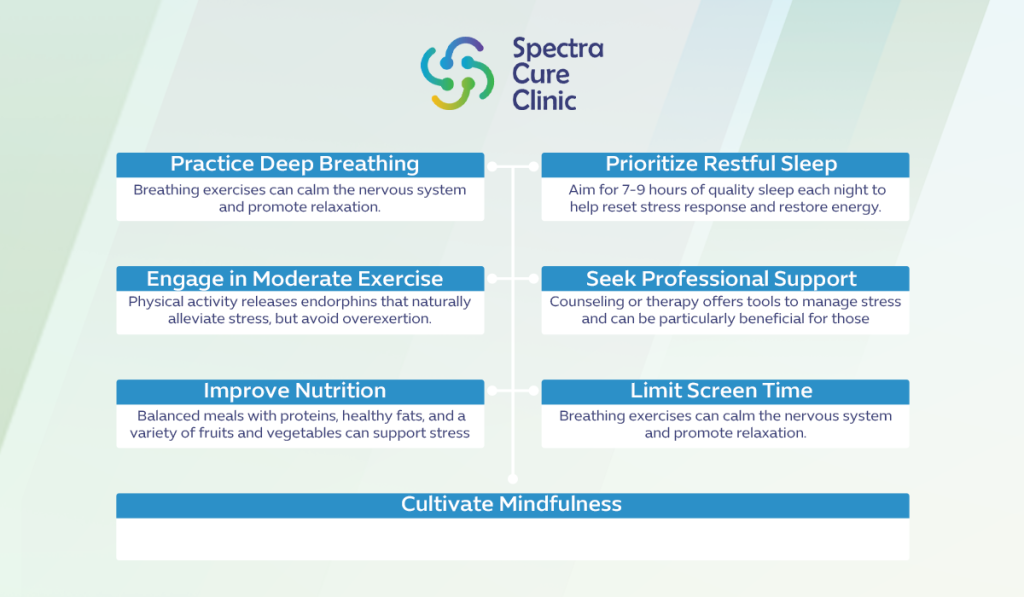
How Chronic Stress Impacts Physical and Mental Health
Chronic stress, or prolonged mental and physical tension, can have lasting
impacts on overall health. Unlike short-term stress, which can motivate
action and problem-solving, chronic stress wears down the body’s ability to
cope.
This ongoing tension has been linked to conditions like heart disease,
diabetes, depression, digestive issues, and weakened immunity.
Exploring how stress impacts various body systems offers insight into its
pervasive effects and highlights the need for effective stress management.
Moreover, let’s discover more about the role of Dopamine & Chronic Stress
Dopamine is a neurotransmitter that influences motivation, pleasure, and
learning. Under chronic stress, dopamine levels can be affected, potentially
lowering motivation and creating feelings of apathy or exhaustion.
For parents, children, and adults managing stressful situations daily, this
imbalance in dopamine can make daily routines feel even more challenging.
Furthermore, Chronic Stress can impact Physical and Mental Health
Chronic stress influences nearly every major body system.
Here are some of the key ways it impacts our physical and mental well-being:
Here are some of the key ways it impacts our physical and mental well-being:
- Heart and Blood Vessels: Persistent stress elevates heart rate and can lead to high blood pressure, increasing the risk of heart disease and stroke.
- Digestive System: Stress redirects blood away from the digestive system, slowing down digestion and causing discomfort, bloating, or even nausea. This lack of proper blood flow can also exacerbate conditions like irritable bowel syndrome (IBS) or digestive pain, which is common in individuals under high stress.
- Brain and Memory: Chronic stress triggers the release of hormones that initiate the “fight or flight” response, affecting parts of the brain responsible for memory, learning, and emotional regulation.
- Respiratory System: Stress affects breathing patterns, often causing shallow breaths or shortness of breath, which reduces oxygen intake. This effect may worsen symptoms in people with conditions like asthma or other respiratory challenges, impacting day-to-day breathing and physical activity
- Adrenal Glands and Cortisol: The adrenal glands produce cortisol, the primary stress hormone, which helps regulate metabolism, inflammation, and blood pressure.
- Musculoskeletal System: Muscle tension, particularly in the neck, shoulders, and back, is a common symptom of chronic stress. This prolonged tension can lead to tension headaches or even chronic migraines.
- Reproductive Health: Prolonged stress disrupts reproductive hormone balance, impacting libido, fertility, and menstrual regularity. The cycle of stress and hormonal imbalance can further complicate family planning and overall reproductive health.
Chronic stress is often caused by cumulative pressures that affect emotional and
physical health over time. Common stressors include:
- Information Overload: Constant exposure to social media, news, and digital information can lead to mental fatigue and increase stress.
- Relationship Conflicts: Family or work-related conflicts can elevate stress, particularly when unresolved.
- Multitasking Expectations: Balancing work and caregiving roles, especially with added responsibilities, can lead to overwhelming feelings all the time.
- Financial Strain: Financial stressors impact mental health, making day-to-day challenges feel even greater.
- Social Isolation: Reduced social support or limited interactions can increase feelings of stress and loneliness and not having enough time to spend in nature as well.
- Traumatic Events: Life events like the death of a loved one or global crises can create enduring stress
Worthy to mention that the Relation of Chronic stress to PANDAS & PANDS in children as well;
PANDAS and PANS are pediatric conditions characterized by the sudden onset of
neuropsychiatric symptoms such as obsessive-compulsive behaviors, ADHD-like symptoms,
and mood disturbances
PANDAS is specifically associated with a recent Streptococcal infection, leading to the
development of anti-streptococcal antibodies that may trigger neurological impairments. In
contrast, PANS does not require an infection trigger and may arise from other stressors or
immune responses, but it still leads to similar symptoms, including behavioral regressions,
emotional instability, and difficulties in concentration and learning.
Chronic stress can exacerbate the symptoms of PANDAS and PANS. Stress-induced increases
in cortisol levels may interfere with immune function, potentially worsening the autoimmune
response that characterizes these disorders. Chronic stress also impacts dopamine levels,
which are related to mood, motivation, and attention. In children with PANDAS or PANS,
fluctuations in dopamine may worsen symptoms like irritability, hyperactivity, and sleep
disturbances. This makes managing stress an essential part of supporting children with these
conditions.
Parents can help reduce the impact of chronic stress on children with PANDAS or PANS by
creating a stable, low-stress environment. Implementing strategies such as mindfulness,
structured routines, supportive counseling, and nutrition optimized for stress resilience can aid
in managing symptoms and improving the quality of life for these children.
Practical Tips for Managing Chronic Stress for Everyone
Chronic stress requires a proactive approach to manage its impacts on
well-being. Here are strategies to reduce and prevent its negative effects:
- Practice Deep Breathing: Breathing exercises can calm the nervous system and promote relaxation.
- Prioritize Restful Sleep: Aim for 7-9 hours of quality sleep each night to help reset stress response and restore energy.
- Engage in Moderate Exercise: Physical activity releases endorphins that naturally alleviate stress, but avoid overexertion.
- Seek Professional Support: Counseling or therapy offers tools to manage stress and can be particularly beneficial for those experiencing high caregiving demands.
- Improve Nutrition: Balanced meals with proteins, healthy fats, and a variety of fruits and vegetables can support stress resilience and mood.
- Limit Screen Time: Reducing digital media exposure can reduce mental overload and improve focus on daily priorities.
- Cultivate Mindfulness: Mindfulness exercises like meditation or guided breathing help manage negative emotions and improve clarity.
- Set Boundaries and Delegate: Reassess tasks and hand off responsibilities where possible to reduce the feeling of overload.

In summary, chronic stress can have extensive impacts on both physical and mental health, affecting everything from heart health to memory and emotional
well-being.
By adopting supportive habits—such as practicing mindfulness, improving sleep,
managing nutrition, and seeking professional guidance—individuals can build
resilience and mitigate the negative effects of stress. Taking proactive steps helps
create a healthier, more balanced life.
Post Views: 575

